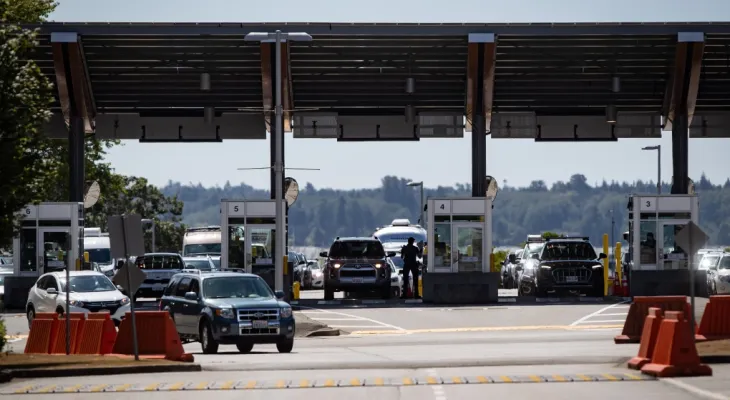Search here
Newspaper
Search here

Arab Canada News
News

Published: June 8, 2024
The union representing 9,000 workers at the Canada Border Services Agency said on Friday that they will not strike until at least Wednesday, as mediation continues.
The Canadian Public Service Alliance initially stated that border workers were scheduled to strike as early as 4 p.m. on Friday if the two sides did not reach an agreement.
But shortly after 4 p.m., a spokesperson for the union said negotiations would continue.
The spokesperson later on Friday said a new strike deadline would be set in the coming days, and job action remains possible if an agreement is not reached at the table.
The federal Treasury Board said on Friday that it is pleased with PSAC's commitment to stay at the negotiation table.
The ministry stated: "So far, discussions have been fruitful, and we remain committed to reaching a fair and reasonable agreement for members of the border services group as soon as possible."
The union did not immediately clarify how the talks were proceeding.
The union warned that a similar strike three years ago led to a halt in commercial traffic across the border and caused significant delays nationwide.
The government says that 90% of front-line border officers are classified as essential, meaning they cannot stop working during the strike.
But union members can work to rule, which is a tactic in which employees perform their jobs exactly as stipulated in their contracts.
Experts say this could still lead to a serious slowdown, which could turn into massive disruptions given the volume of traffic that typically moves across the border.
The border agency stated in its announcement: "Canada Border Services Agency (CBSA) employees in essential service positions must provide uninterrupted border services and cannot deliberately slow down border processing."
However, experts have questioned the feasibility of the government taking action against workers who follow procedures and perform their jobs to the fullest.
Ian Lee, an associate professor at Carleton University's business school, said in an interview last week that the strike would not only pose problems for tourists but would have "a very significant impact on the economy."
Canadian manufacturers and exporters warned on Thursday that the strike would affect goods crossing the border every day worth $3.1 billion.
The group stated: "Job action would slow commercial traffic at the border and ports of entry, affecting international travel and the delivery of mail and packages, and disrupting the collection of duties and taxes on goods entering Canada."
"In short, the strike would significantly disrupt any trade or business travel for manufacturers."
Mark Weber, in an interview last week, said members want pay equity with other law enforcement agencies. He is the national president of the Customs and Immigration Union, which is part of PSAC.
Other issues include pension benefits and protections around "strict discipline."
The union is also concerned about the encroachment of technology on jobs that could have been performed by officers, such as customs kiosks installed at Canadian airports. They have also requested the inclusion of work-from-home arrangements in the collective agreement.
Treasury Board President Anita Anand told the House of Commons on Thursday that the government is "committed to reaching a fair agreement for employees and Canadian taxpayers."
During the question period, she stated: "We are fully prepared to make concessions, but we expect that to happen on the other side as well."
Comments